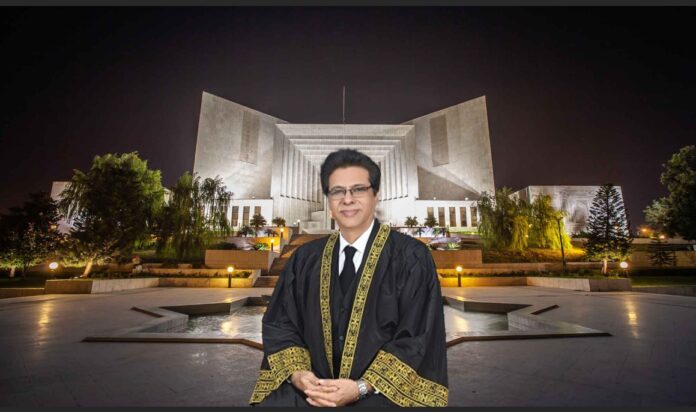Justice Mazhar Clarifies Powers of Constitutional Bench Under 26th Amendment During Supreme Court Proceedings
In a significant legal development, Justice Muhammad Ali Mazhar stated that the Supreme Court’s constitutional bench now has the authority to take suo motu notices, a power that was previously vested solely in the Chief Justice of Pakistan (CJP). This clarification came during the hearing of an anti-terrorism case on Friday.
Justice Mazhar explained, “The procedure has changed following the [26th Constitutional] Amendment, but the Supreme Court retains its authority to take suo motu notices. The difference is that these cases will now be adjudicated by a constitutional bench.”
The newly formed constitutional bench is headed by Justice Amin-ud-Din Khan and includes Justices Jamal Khan Mandokhail, Muhammad Ali Mazhar, Syed Hasan Azhar Rizvi, Musarrat Hilali, and Naeem Akhtar Afghan. The bench is set to hear several high-profile cases, with a cause list issued for November 18 to 22.
Key Cases and Proceedings:
Use of Islamabad Convention Centre
The bench addressed the private usage of the Islamabad Convention Centre and sought a response from the Attorney General’s office. Justice Mandokhail emphasized that the centre should operate per its institutional policies. The Additional Attorney General was given time to collect details on outstanding dues, and the hearing was adjourned.
Recovery of Embezzled Funds and Undisclosed Accounts
The court reviewed a case concerning the recovery of funds embezzled through undisclosed foreign accounts. Advocate Hafiz Ahsan highlighted that income tax laws had been amended to aid such recoveries. Justice Mazhar instructed the Federal Investigation Agency (FIA) and Federal Board of Revenue (FBR) to submit detailed reports, ensuring accountability.
Contempt Case Against Ex-Ombudsperson
In a contempt case involving former Federal Ombudsperson Yasmin Abbasi, the bench debated whether proceedings should continue. Justice Mazhar noted Abbasi’s defiance of a Lahore High Court (LHC) stay order, which constituted contempt. The court issued notices to the current ombudsperson and granted time for further submissions.
IT University in Islamabad
The court reviewed a petition regarding the establishment of an IT university in Sector I-17. Justice Hilali expressed concern over potential misuse of the land intended for educational purposes, urging stakeholders to resolve the matter amicably. The hearing was adjourned for 10 days.
Lady Health Workers’ Petition
Petitions filed by lady health workers against the Sindh government were also addressed. The Advocate General of Sindh confirmed compliance with regularization orders. However, Justice Mazhar questioned the adequacy of benefits provided, instructing the government to clarify its policies for these workers.
Rights of Judicial Employees
In another hearing, the bench discussed appeal rights for judicial employees. Justice Mandokhail noted that the formulation of rules lies within the jurisdiction of respective high courts, emphasizing the limitations of Article 199, Sub-section 5. Notices were issued, and the matter was adjourned.
Suo Motu Powers and the Role of the Constitutional Bench
The constitutional bench reaffirmed its authority to take suo motu notices, a point of contention post-26th Amendment. Justice Mazhar reiterated that the amendment altered the process, not the powers, with cases now directed to a constitutional bench for adjudication.
New Bench Clears Backlog
The newly constituted bench aims to address the extensive backlog of cases in the Supreme Court. In its first two days, the bench disposed of multiple cases, issued notices, and adjourned others for further review.
The bench’s focus on efficiency and justice was evident as it tackled complex cases ranging from contempt proceedings to recovery of national assets. This initiative marks a critical step in streamlining judicial processes and ensuring timely justice.




